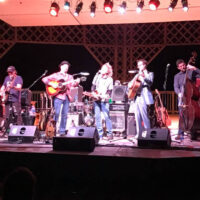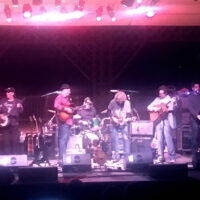
Sam Bush at the 2018 Bender Jamboree – photo © Erik Kabik
To bluegrass fans, it’s no secret, but spend enough time watching or listening to Sam Bush, and you’re bound to be as enamored by his inexhaustible good humor and energy as you are his by his virtuosity. The image of Bush on stage—spry, copper, shoulder-length hair bouncing as notes cascade from his F-5, “Hoss—is an all too familiar one to festival goers everywhere.
The former New Grass Revival frontman, now 66, is still on the road, and stopped by Western Connecticut State University’s Ives Concert Center for a show that not only showcased Bush’s trademark eclectic style, but was rich with bluegrass classics as well. Openers Tony Trischka and Michael Daves played a galvanizing first set.
I had the chance to speak to Bush from his hotel room in Pennsylvania on Thursday before his performance. Laconic and gentle, with a good-natured, cheeky sense of humor, Bush exudes all of the same qualities that his music does: charm, complexity, and a lot of fun.
What are, (if there are any) some of the new lessons you’ve learned from being on the road this year?
“The whole year started out in Colorado playing with Hot Rize, and being on their 40th anniversary [in Boulder, Colorado]. As we go through life, a few old friends have left the earth, and more than anything, I find myself reaffirming just how much I love to play, and getting out and doing this. I’m just really happy to be working with my friends. Playing with this band, it’s my joy. They’re my favorite musicians.”
You’re always so physically and emotionally invested in your performances, which is why watching you live is such a viscerally rewarding experience. Do you ever get burnt out or exhausted at any point on the road, and what do you do to avoid succumbing to the physical challenges of touring live.
“I have jokingly, or not so jokingly, said in the past, what we do is travel for a living. My reward is the time that we spend on stage. Of course we get tired traveling, and I’m aging, right? I’ve always been fortunate that when I get to be part of a musical ensemble, music overtakes me, so to speak. If it looks like a joyful experience, it is. Plus, I’ve had a couple of bouts with cancer, and I learned a long time ago, I’m not sweating the small stuff.”
There’s a great in story in Richard D. Smith’s book, Can’t You Hear Me Calling, which is his biography of Bill Monroe, where, when you were undergoing treatment for cancer, Monroe called you and gave you a pep talk. That was one of my favorite parts of reading Bill’s life story.
“He didn’t like our long our long hair, and it’s hard to know whether he liked our music per se, but that was kind of the olive branch when he called me in the hospital. And, he played on a benefit for me, and it was great for Bill Monroe and John Duffey and Jethro Burns to be calling in the hospital.
When [Emmylou Harris] cut a live record at the Ryman Auditorium, [At the Ryman, 1992] which we won a Grammy for Country Vocal Group, of all things, she was dancing a lot then, and she had Bill come out and dance with her. They were changing the tape reels, and Bill and I ended up playing a duet together. Sometimes a life snapshot comes through, and then it did.”
You’re often referred to as the “Father” of newgrass. Does the word newgrass mean the same thing as it always has, or does it carry a different meaning nowadays?
“It probably means something different now, 40 years later. It’s turned into a generic name for a type of music. Me and New Grass Revival, we were one of the groups that brought on this type of different bluegrass. We were already influenced by the Osborne Brothers, Jim & Jesse, and progressive people like the Dillards.
There was a band from North Carolina called the New Deal String Band. The person that played fiddle with them, Kenny Kosek, on occasion, was also in this great band that we’d shared the stage with sometimes called Breakfast Special, from the northeast. And lo and behold, their banjo player, Tony Trischcka, is one of the most progressive banjo players that ever lived.
I certainly don’t call self the father of anything other than a girl named Jessica. We were all part of it.”
As a pioneer in bluegrass music, what do you think the future of bluegrass holds? Is it even worth talking about the future of the music in the first place since we’re always seeing new approaches?
“We haven’t set out to change anything, we’re just playing it the way we feel it. When it comes to the world of bluegrass, it’s such an open field now. That’s the way I like it, open.
Right now, my favorite mandolin player that’s kicking everybody hard is Sierra Hull. One thing that’s great that’s happening in the world of bluegrass right now is that ladies are being recognized for being great musicians. When you have Sierra Hull winning on mandolin, Molly Tuttle on guitar, Becky Buller on fiddle, Missy Raines on bass, Kristin Benson on banjo, there you go: we’ve broken the good ol’ boys’ club.”
Your Gibson F-5, Hoss, is such an iconic instrument. What’s the story of your relationship with it?
“It’s a 1937 Gibson F-5. I knew of the mandolin before Norman Blake acquired it, but Blake acquired it, and then played it on the John Hartford Morning Bugle album. Randy Wood did the braces and it sounded like a million bucks, so I dropped to my knees, and asked Norman to sell it to me. He traded it to Tut Taylor, who then told Tut, ‘Call Sam, he wants it.’ So I got the mandolin from Tut Taylor in January of 1973. I think Tony Rice named him ‘Ol’ Hoss.'”
What could the music world of today learn from John Hartford, since he was such a luminescent figure?
“Just keep you mind open. Learn from different things. John and I would admire the fiddle playing of Texas Shorty while at the same time, the next thing we’d listen to [was] Mahavishnu Orchestra and John McLaughlin, [and then,] Stevie Wonder’s Inner Visions. He was one of the most progressive musicians I’ve ever met. John was always digging on the next new sound.”









